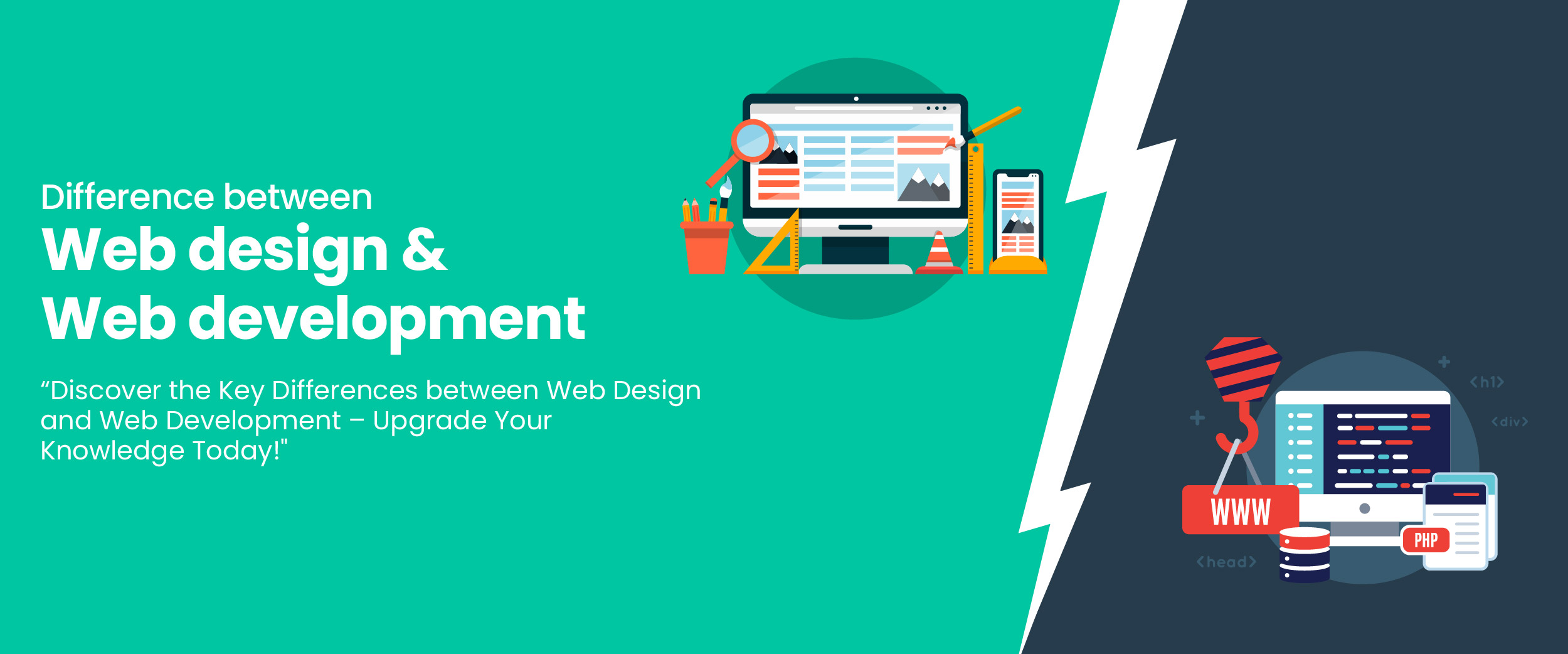Difference between Web Design and Web Development
The world of web creation is constantly evolving, with new technologies and trends emerging every day. Despite this, the two key fields within web creation, i.e. web design and web development, remain unchanged.
While these two fields are often used interchangeably, they are distinct and require different skill sets and knowledge. Web development focuses on creating websites and applications. Web design is concerned with the aesthetics and usability of a website.
In this blog, we will take an in-depth difference between web design and web development. We will also learn about web designers vs web developers.
Introduction to Web Design and Web Development
Developing a website’s graphical and visual components is known as web design. It entails creating a website’s layout, color scheme, typography, overall look and feel of the website, user interface, and user experience.
The technical part of website creation, such as coding, programming, and server-side scripting, is part of web development. It includes the website’s features and functionalities. The goal of web development is to create websites that are not only beautiful to look at but also easy to use.
You can also pursue a web development course to develop in-demand skills and gain in-depth knowledge.
Key Differences Between a Web Designer and Web Developer
Both web designers and web developers play an important role in creating websites but they have different skills and areas of focus. Given below is a table showcasing the differences between a web designer and a web developer.
| Parameter | Web Designer | Web Developer |
| Role | Focuses on the visual aspects of a website, such as color scheme, typography, and layout. | Focuses on the technical side of a website, like programming, coding, and other functionalities. |
| Tools | Designers use tools, such as Photoshop, Figma, Sketch, etc. | Developers use programming languages, such as Python, PHP, and Ruby on Rails. |
| Goal | Focuses on creating a website that is user-friendly, pleasing, and easy to navigate. | Focuses on creating a website that is efficient and functional and does not collapse. |
| Educational Background | Mostly have a degree in Graphic Design and have more of a creative background. | Generally have a degree in Engineering or a technical background. |
| Skill Set | They should have knowledge of various platforms used in designing, HTML, CSS, and even Search Engine Optimization. | They should have coding, testing, and debugging skills along with knowledge of platforms, browsers, libraries, and frameworks. |
| Types | Major types of web designers include UI, UX, and visual designers. | Different types of web developers include back-end, front-end, and full-stack developers. |
| Hiring Cost | The hiring cost for a web designer is comparatively less than for a web developer. | The hiring cost for a web developer is more than that of a web designer. |
| Salary | They get paid less than web developers. The average annual salary is around $63,000. | They get paid more than web designers. The average annual salary is around $82,000. |
Web Designers Vs Web Developers
The following section will help you understand the topic of web designers vs web developers.
1. Roles and Responsibilities
A web designer’s primary responsibility is to create aesthetically pleasing and user-friendly websites. It includes creating layouts, working with color schemes, and designing static and animated graphics. They ensure that the website is optimized for different platforms and devices.
The role of a web developer is to create and maintain websites and applications. Precisely, they are responsible for developing the functionality of websites, including troubleshooting, identifying, and fixing any errors or issues.
2. Skills
A web designer needs to have both creative and technical skills, while a web developer needs strong coding skills. Let us look at the skill sets for both separately.
A web designer must have the following creative and technical skills.
- Design Principles: They should be able to work with visual design principles, such as typography, color palettes, and web fonts to create aesthetically pleasing designs.
- Design Software Applications: They must have proficiency in working with design software like Illustrator, Adobe Photoshop, InDesign, Google Web Designer, and Sketch to curate web design.
- HTML: They are supposed to have basic coding knowledge in HTML to structure the web content (text, images, videos, etc.).
- CSS: They should also have the ability to work with CSS (Cascading Style Sheet) to format the web page design.
- SEO: They should be familiar with search engine optimization techniques to make the website SEO-friendly.
A web developer should possess the following technical skills.
- Programming Languages: For web development, a strong foundation in programming languages, such as JavaScript, PHP, Python, HTML, etc. is crucial.
- Code Versioning Technology: A web developer must be able to track changes made to code over time (code versioning). For this purpose, they should be familiar with Git, which allows a developer to review previous changes made to the code before making new changes.
- Backend Web Development Framework: They should be able to work with languages, such as object-oriented programming, .NET, and Java. They should also know how to operate on APIs (application programming interfaces), CMS (content management system) platforms, and web hosting services.
- Testing and Debugging: They should be able to test and debug code for accuracy and efficiency. They should also be able to identify and troubleshoot any issues that arise during coding.
Aspiring to become a Web developer! Join our full stack web developer course with placement and start your dream journey.
3. Average Annual Salary
The average annual salary of a web developer is higher than that of a web designer. This is because the field of web development is technical and requires skilled professionals to create the functionality of the website or web application.
Let’s take a look at the average annual salary of web designers and developers in India, based on their experience.
| Level | Web Designer’s Average Salary | Web Developer’s Average Salary |
| Entry-Level (0-1 year) | ₹ 2 Lakhs | ₹ 2.2 Lakhs |
| Mid-Level (2-5 years) | ₹ 4 Lakhs | ₹ 4.7 Lakhs |
| Experienced-Level (5+ years) | ₹ 4.6 Lakhs | ₹ 6 Lakhs |
Key Aspects of Web Design and Web Development
Given below are the key aspects of web design and web development.
Key Aspects of Web Design
One of the key aspects of web design is usability. It refers to the ease with which a user can navigate and use a website. It focuses on the visual components of a website, such as layout, color, content, etc. It also involves applying design principles to create an aesthetically pleasing user experience.
Responsive design is another key component of web design. It is crucial to design responsive websites so that they are easily accessible on mobile devices. It ensures that users have a positive experience when visiting a website, regardless of their device.
Key Aspects of Web Development
One of the key aspects of web development is functionality. It refers to the features and functionality of a website, such as form submissions, e-commerce, and database integration.
Security is another crucial component of web development. Given the rise in cyberattacks, website security and protection against potential threats are crucial. Therefore, protecting sensitive data, such as passwords, credit card numbers, and other sensitive information is a major responsibility.


Conclusion
We hope you have understood the differences between web designers and web developers through this blog on the difference between website design and website development. This will help businesses build a stronger connection with their audience. With the right knowledge and skills, you can become a valuable asset to these businesses.
So, which field interests you the most? Web development or web design? Tell us in the comment section below. You can also explore web development projects for beginners to advanced levels and begin your professional journey by gaining hands-on experience working on these projects.







